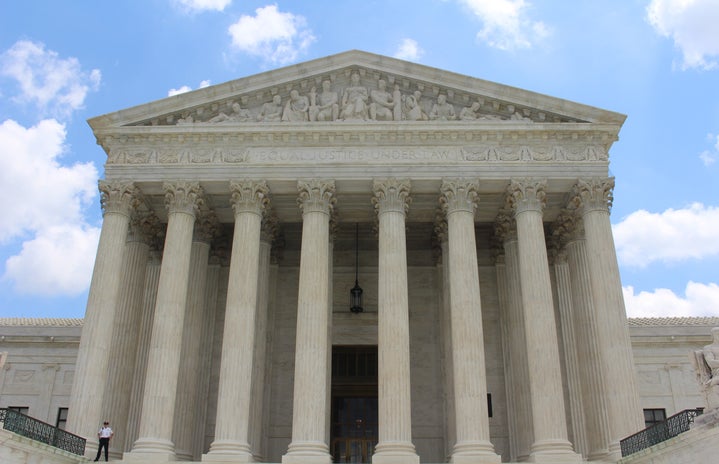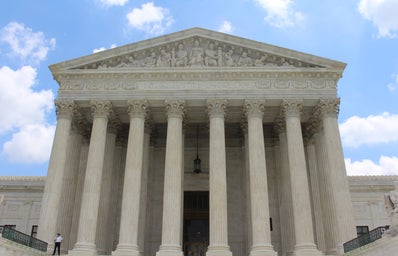For the first time in modern history, a Supreme Court of the United States (SCOTUS) majority opinion draft was leaked to the public. Here are the most recent updates about the leak and Roe v. Wade.
What is SCOTUS?
SCOTUS’s primary role in the United States government is to determine whether or not lower court rulings uphold constitutional law. SCOTUS is responsible for the objective interpretation of the United States Constitution. The debate as to whether or not to strictly or loosely interpret the constitution goes back to the very beginning of our nation’s history. This question of how to interpret the constitution is why women have the right to vote in the constitution, but not necessarily equal rights.
What’s so important about Roe v. Wade?
Roe v. Wade was another landmark case that originated in Texas in 1973. Roe v. Wade was intended to attack the state’s abortion criminalization law. During court, the case turned into a right to privacy debate. The idea that criminalizing abortions would directly infringe a woman’s right to privacy ultimately became the argument that allowed “Jane Roe” to win the case.
“This right of privacy, whether it be founded in the Fourteenth Amendment‘s concept of personal liberty and restrictions upon state action, as we feel it is, or … in the Ninth Amendment’s reservation of rights to the people, is broad enough to encompass a woman’s decision whether to terminate her pregnancy,” states Roe, 410 U.S. at 153.
Can SCOTUS overrule a previous ruling?
The SCOTUS justices are expected to be well-educated, objective and a just body of government intended to protect the rights of United States citizens given to them by the constitution. There are many procedures in place, but SCOTUS usually follows precedent when it comes to voting on controversial court rulings. However, SCOTUS is human and has overturned court rulings before. For example, in 1964, SCOTUS voted in favor of Brown v. Board of Education, the landmark case which integrated schools nationwide and overturned the previously favored Plessy v. Ferguson. Therefore, it makes sense why SCOTUS has earned the final say on controversial matters, such as abortion.
Roe v. Wade has been supported by multiple court rulings since. Including Planned Parenthood v. Casey. During this case, an initial majority of five justices were willing to overturn the Roe v. Wade ruling, but Justice Kennedy changed his mind after the opening statements. Planned Parenthood v. Casey not only supported abortion as a right to privacy but as an individual’s liberty to make choices “relating to marriage, procreation, contraception, family relationships, child-rearing and education.”
Is it likely that SCOTUS will overrule Roe v. Wade?
On May 2, only six months before the midterm elections, a 98-page document was leaked to Politico, a political journalism publication based in Arlington, Virginia. This document turned out to be the SCOTUS majority opinion draft on a Mississippi case that could overrule Roe v. Wade.
“Roe was egregiously wrong from the start,” the document reads.
The draft written by Justice Samuel Alito describes that the SCOTUS majority is in favor of overturning the decision to protect abortion rights. This decision, while huge, is not necessarily surprising. In recent years, SCOTUS has seen a high overturn of justices. Justices Neil Gorsuch, Brett Kavanaugh, Amy Coney Barrett and Kentanji Brown Jackson were all confirmed within the last six years. Four of these five justices have identified as Republican, a conservative and pro-life political party.
This leaked draft is not final. The upcoming case will allow for counterarguments to be made, and the very public leak of the opinions could sway one of the justices away from voting to overturn Roe v. Wade, similar to what happened with Planned Parenthood v. Casey.
So, although this leaked majority opinion document does state that the majority of justices serving on SCOTUS currently lean toward overturning abortion rights in the United States, it is not certain what will happen.
What happens if Roe v. Wade is overturned by SCOTUS?
If SCOTUS votes to overturn Roe v. Wade, then abortion rights will not be protected by federal law. It will be up to the individual states to decide what women’s health and reproductive rights will look like, which would allow states like Texas to outlaw abortion entirely. The Center for Reproductive Rights curated this map that shows which states are more likely to protect and which are more likely to ban abortion rights. According to this map, 24 states—almost half of the United States—would likely ban abortion.
How can I keep up with what’s happening next?
The New York Times is reporting LIVE updates on the Supreme Court v. Abortion as more news unfurls.
Want to see more HCFSU? Be sure to like us on Facebook and follow us on Instagram, Twitter, TikTok, YouTube and Pinterest!


